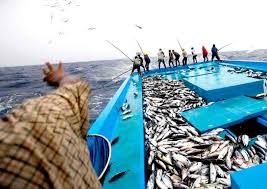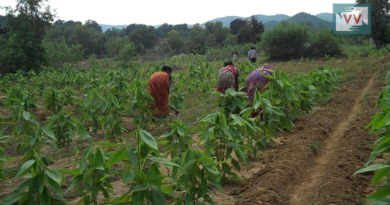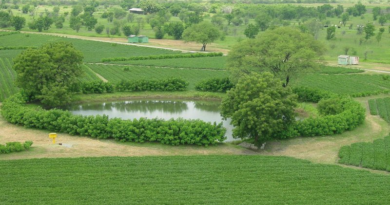Fisheries Extension Associate
Contents

Fisheries Extension Associate
TO SECTOR: AGRICULTURE AND ALLIED
SUB-SECTOR: Fisheries OCCUPATION: Assistance (Fisheries) REFERENCE ID: AGR/Q5107 ALIGNED: NCO-2015/NIL
A Fisheries Extension Associate is responsible for mobilizing members of the fishing community for extension training and other activities at community level.
Brief Job Description: A Fisheries Extension Associate is responsible for providing assistance in ensuring active community participation, identifying target group for the training and other community level activities.
Personal Attributes: A Fisheries Extension Associate must possess excellent communication, facilitation, organizing and implementations skills for various development programmes. S/he must be able to comprehend and synthesize the socio-political situation and decide strategies and actions accordingly Fisheries Extension Associate

| Qualifications Pack Code | AGR/Q5107 | ||
| Job Role | Fisheries Extension Associate | ||
| Credits (NSQF) | TBD | Version number | 1.0 |
| Sector | Agriculture and Allied | Drafted on | 10/03/16 |
| Sub Sector | Fisheries | Last reviewed on | 25/11/16 |
| Occupation | Assistance (Fisheries) | Next review date | 31/10/19 |
| NSQC Clearance on | N/A |
| Job Role | Fisheries Extension Associate |
| Role Description | A Fisheries Extension Associate is responsible for mobilizing members of the fishing community for extension training and other activities at community level. |
| NSQF level Minimum Educational Qualifications Maximum Educational Qualifications | 3 |
| Class 8, preferably Not applicable | |
| Training (Suggested but not mandatory) | On the job training |
| Minimum Job Entry Age | 18 years |
| Experience | 0-6 months as a facilitator in development projects Fisheries Extension Associate |
| Applicable National Occupational Standards (NOS) | Compulsory: and implementation of developmental programmes in fisheries 2. |
| Performance Criteria | As described in the relevant OS units |
| Keywords /Terms | Description |
| Sector | Sector is a conglomeration of different business operations having similar business and interests. It may also be defined as a distinct subset of the economy whose components share similar characteristics and interests. |
| Sub-sector | Sub-sector is derived from a further breakdown based on the characteristics and interests of its components Fisheries Extension Associate |
| Occupation | Occupation is a set of job roles, which perform similar/ related set of functions in an industry. |
| Function | Function is an activity necessary for achieving the key purpose of the sector, occupation, or an area of work, which can be carried out by a person or a group of persons. Functions are identified through functional analysis and form the basis of OS. Occupation is a set of job roles, which perform similar/ related set of functions in an industry. |
| Sub-function | Sub-functions are sub-activities essential to fulfil the achieving the objectives of the function. |
| Job role | Job role defines a unique set of functions that together form a unique employment opportunity in an organisation. |
| Occupational Standards (OS) | OS specify the standards of performance an individual must achieve when carrying out a function in the workplace, together with the knowledge and understanding they need to meet that standard consistently. Occupational Standards are applicable both in the Indian and global contexts. |
| Performance Criteria | Performance criteria are statements that together specify the standard of performance required when carrying out a task. |
| National Occupational Standards (OS) | NOS are occupational standards which apply uniquely in the Indian context. |
| Qualifications Pack (QP) | QP comprises the set of OS, together with the educational, training and other criteria required to perform a job role. A QP is assigned a unique qualifications pack code. |
| Unit Code | Unit code is a unique identifier for an Occupational Standard, which is denoted by an ‘N’ |
| Unit Title | Unit title gives a clear overall statement about what the incumbent should be able to do. |
| Description | Description gives a short summary of the unit content. This would be helpful to anyone searching on a database to verify that this is the appropriate OS they are looking for. |
| Scope | Scope is a set of statements specifying the range of variables that an individual may have to deal with in carrying out the function which have a critical impact on quality of performance required Fisheries Extension Associate |
| Knowledge and Understanding | Knowledge and understanding are statements which together specify the technical, generic, professional and organisational specific knowledge that an individual needs in order to perform to the required standard. |
| Organisational Context | Organisational context includes the way the organisation is structured and how it operates, including the extent of operative knowledge managers have of their relevant areas of responsibility. |
| Technical Knowledge | Technical knowledge is the specific knowledge needed to accomplish specific designated responsibilities Fisheries Extension Associate |
| Core Skills/ Generic Skills | Core skills or generic skills are a group of skills that are the key to learning and working in today’s world. These skills are typically needed in any work environment in today’s world. These skills are typically needed in any work environment. In the context of the OS, these include communication related skills that are applicable to most job roles Fisheries Extension Associate |
Qualifications Pack For Fisheries Extension Associate
| Keywords /Terms | Description |
| NOS | National Occupational Standard(s) |
| QP | Qualifications Pack |
| OS | Occupational Standard |
| PC | Performance Criteria |
| SOP | Standard Operating Procedure |
| CRZ | Coastal Regulation Zone |
| VHF | Very High Frequency |
| GPS | Global Positioning System |
National Occupational Standard

Overview
This OS unit is about providing assistance in organizing extension training and implementation of development programmes in fisheries.
| Unit Code | AGR/N5113 |
| Unit Title (Task) | Assist in organizing extension training and implementation of development programmes in fisheries |
| Description | This OS unit is about providing assistance in organizing extension training and implementation of development programmes in fisheries. |
| Scope | This unit/ task covers the following: Identify target group and determine number, location, date and time of trainingOrganize logistics and provide assistance in organizing the trainingCollect feedback, responses and announce follow-ups, if any |
| Performance Criteria(PC) w.r.t. the Scope | |
| Element | Performance Criteria |
| Identify target group, and determine number, location, date and time of training | To be competent, the user/ individual must be able to: PC1. identify the target group in the village and number of trainees PC2. plan the training keeping in mind fishing holidays as they are the only days active fishermen can be mobilised PC3. roll out the training calendar |
| Organize logistics and provide assistance during the training | To be competent, the user/ individual must be able to: PC4. organize the logistics required for the training venuetraining materialstraining equipmentspractical handouts/training handoutsparticipant handbooks PC5. provide assistance during the training as briefed by the trainer PC6. keep records of the training process and ensure the training proceeds smoothly |
| Collect feedback, responses and announce follow ups if any | To be competent, the user/ individual must be able to: PC7. assist the trainer in collecting feedback from the training PC8. collect outputs if any, and signatures of participants wherever required PC9. announce the date and time of the next training, which would be carried out as a follow up Fisheries Extension Associate |
| Knowledge and Understanding (K) | |
| A. Organizational Context (Knowledge of the company / organization and its processes) | The individual on the job needs to know and understand: KA1. procedures followed for community participation and mobilisation by the training organisation KA2. rules and regulations to be followed according to fishing industry standards and as set by the training organisation KA3. administrative and financial rules of the training organisation KA4. record keeping procedures followed by the organisation |
| B. Technical Knowledge | The individual on the job needs to know and understand: KB1. community mobilization techniques KB2. dynamics of the fishing community in terms of individuals and groups KB3. constraints of time when fishermen are ashore KB4. daily routine of fishermen KB5. effective means of disseminating information about training and its efficacy |
| Skills (S) | |
| A. Core Skills/ Generic Skills | Reading Skills |
| The user/individual on the job needs to know and understand how to: SA1. read and understand all base documents pertaining to the conduct of the training SA2. read procedure and any material that may be required to be read while carrying out training activities | |
| Writing Skills | |
| The user/individual on the job needs to know and understand how to: SA3. maintain minutes of the training SA4. maintain attendance reports SA5. write simple letters for invitation and other purposes to community leaders SA6. compile feedback forms and short reports | |
| Oral Communication (Listening & Speaking Skills) | |
| The user/individual on the job needs to know and understand how to: SA7. interact positively with members of the fishing community | |
| B. Professional Skills | Decision Making |
| The user/individual on the job needs to know and understand: how to SB1. assist in deciding target group for training and choose participants as indicated by the training organisation | |
| Plan and Organize | |
| The user/individual on the job needs to know and understand how to: SB2. plan and organize trainings well ahead keeping in mind participants schedules and holidays | |
| Customer Centricity | |
| The user/individual on the job needs to know and understand how to: SB3. maintain good relationships and politeness with fisher folk and encourage them to attend trainings | |
| Problem Solving | |
| The user/individual on the job needs to know and understand how to: SB4. assist in solving problems that may occur at any stage during the course of the programme | |
| Analytical Thinking |
| The user/individual on the job needs to know and understand how to: SB5. apply domain information about the fishing community so as to mobilise them effectively for training | |
| Critical Thinking | |
| The user/individual on the job needs to know and understand how to: SB6. use common sense and make judgments on day to day basis SB7. use reasoning skills to identify and resolve basic problems SB8. understand and analyze dynamics of the fishing community |
NOS Version Control
| NOS Code | AGR/N5113 | ||
| Credits (NSQF) | TBD | Version number | 1.0 |
| Sector | Agriculture and Allied | Drafted on | 10/03/16 |
| Sub Sector | Fisheries | Last reviewed on | 25/11/16 |
| Occupation | Assistance (Fisheries) | Next review date | 31/10/19 |
National Occupational Standard
Overview
This OS unit is about providing assistance in ensuring the highest level of participation by the fishing community for training activities.
| Unit Code | AGR/N5114 |
| Unit Title (Task) | Ensure highest level of participation by the fishing community |
| Description | This OS unit is about providing assistance in ensuring the highest level of participation by the fishing community for training activities |
| Scope | This unit/ task covers the following: Conduct meetings with community leaders and other key informantsIdentify location, date and time of training in advanceMobilize community for training |
| Performance Criteria(PC) w.r.t. the Scope | |
| Element | Performance Criteria |
| Conduct meetings with community leaders and other key informants | To be competent, the user/ individual must be able to: PC1. locate active fishermen or influential (key) fishermen PC2. find out the times they go out to the waters and the times they are available PC3. assist in organizing series of meetings with the key people of the meeting and provide information on importance of the training PC4. make them comfortable so as to be able to participate fully in the training PC5. assist the trainer in using techniques such as posters, interactive sessions to convey the information |
| Identify location, date and time of training in advance | To be competent, the user/ individual must be able to: PC6. locate a venue suitable and acceptable for members of community that is accessible PC7. fix a date and time that’s convenient for fishermen PC8. send reminders at regular intervals |
| Mobilize community for training | To be competent, the user/ individual must be able to: PC9. mobilize majority of the fishing community from all social, economic and gender sects to attend PC10. listen, put views and assist in influencing the decisions in formal and informal meetings at village level PC11. assist in addressing issues and grievances arising from the community PC12. create awareness amongst the community about the importance of training |
| Knowledge and Understanding (K) | |
| A. Organizational Context (Knowledge of the company / organization and its processes) | The individual on the job needs to know and understand: KA1. guidelines on community mobilization and participation KA2. best practices in community participation |
| B. Technical Knowledge | The individual on the job needs to know and understand: KB1. tools and techniques of community mobilization and organization |
| KB2. sequence of arrangement of training tools and techniques | |
| Skills (S) | |
| A. Core Skills/ Generic Skills | Reading Skills |
| The user/individual on the job needs to know and understand how to: SA1. read and understand all base documents pertaining to the conduct of the training SA2. read procedure and any material that may be required to be read while carrying out training activities | |
| Writing Skills | |
| The user/individual on the job needs to know and understand how to: SA3. maintain minutes of the training SA4. maintain attendance reports SA5. write simple letters for invitation and other purposes to community leaders SA6. compile feedback forms and short reports | |
| Oral Communication (Listening & Speaking Skills) | |
| The user/individual on the job needs to know and understand how to: SA7. interact positively with members of the fishing community | |
| B. Professional Skills | Decision Making |
| The user/individual on the job needs to know and understand: how to SB1. assist in deciding target group for training and choose participants as indicated by the training organization | |
| Plan and Organize | |
| The user/individual on the job needs to know and understand how to: SB2. plan and organize trainings well ahead keeping in mind participants schedules and holidays | |
| Customer Centricity | |
| The user/individual on the job needs to know and understand how to: SB3. maintain good relationships and politeness with fisher folk and encourage them to attend trainings | |
| Problem Solving | |
| The user/individual on the job needs to know and understand how to: SB4. assist in solving problems that may occur at any stage during the course of the programme | |
| Analytical Thinking | |
| The user/individual on the job needs to know and understand how to: SB5. apply domain information about the fishing community so as to mobilise them effectively for training | |
| Critical Thinking |
| The user/individual on the job needs to know and understand how to: SB6. use common sense and make judgments on day to day basis SB7. use reasoning skills to identify and resolve basic problems SB8. understand and analyze dynamics of the fishing community |
NOS Version Control
| NOS Code | AGR/N5114 | ||
| Credits (NSQF) | TBD | Version number | 1.0 |
| Sector | Agriculture and Allied | Drafted on | 10/03/16 |
| Sub Sector | Fisheries | Last reviewed on | 25/11/16 |
| Occupation | Assistance (Fisheries) | Next review date | 31/10/19 |
Annexure
Nomenclature for QP and NOS
Qualifications Pack
9 characters
[ABC]/ Q 0101Insert 3 letter code for SSC]
QP number (2 numbers)
Q denoting Qualifications Pack Occupation (2 numbers)
Occupational Standard
An example of NOS with ‘N’
9 characters
[Insert 3 letter code for SSC]
OS number (2 numbers)
N denoting National Occupational Standard Occupation (2 numbers)
| Sub-sector | Range of Occupation numbers |
| Agriculture Crop Production | 01 – 40 |
| Dairying | 41 – 42 |
| Poultry | 43 – 44 |
| Animal Husbandry | 45 – 48 |
| Fisheries | 49 – 51 |
| Agriculture Allied Activities | 52 – 60 |
| Forestry, Environment and Renewable Energy Management | 61 – 70 |
| Agriculture Industries | 71 – 90 |
| Generic Occupations | 96 – 99 |
| Sequence | Description | Example |
| Three letters | Industry name | AGR |
| Slash | / | / |
| Next letter | Whether QP or NOS | Q or N |
| Next two numbers | Occupation code | 01 |
| Next two numbers | OS number | 01 |
Note:
- The range of occupation numbers have been decided based on the number of existing and future occupations in a segment
- Occupation numbers from 91 – 95 have been intentionally left blank to accommodate any emerging segment in future.
CRITERIA FOR ASSESSMENT OF TRAINEES
Job Role Fisheries Extension Associate
Qualification Pack AGR/Q5107
Sector Skill Council Agriculture Skill Council of India
| Marks Allocation | |||||
| Assessment outcomes | Assessment criteria for outcomes | Total Marks | Out Of | Theory | Skills Practical |
| 1. AGR/N5113 Assist in organizing extension training and implementation of developmental programmes in fisheries | PC1. identify the target group in the village and number of trainees | 100 | 11 | 3 | 8 |
| PC2. plan the training keeping in mind fishing holidays as they are the only days active fishermen can be mobilised | 11 | 4 | 7 | ||
| PC3. roll out the training calendar | 11 | 3 | 8 | ||
| PC4. organize the logistics required for the training | 12 | 4 | 8 | ||
| venue | |||||
| training materials |
| training equipments | |||||
| practical handouts/training handouts | |||||
| participant handbooks | |||||
| PC5. provide assistance during the training as briefed by the trainer | 11 | 3 | 8 | ||
| PC6. keep records of the training process and ensure the training proceeds smoothly | 11 | 4 | 7 | ||
| PC7. assist the trainer in collecting feedback from the training | 11 | 3 | 8 | ||
| PC8. collect outputs if any, and signatures of participants wherever required | 11 | 3 | 8 | ||
| PC9. announce the date and time of the next training, which would be carried out as a follow up | 11 | 3 | 8 | ||
| 100 | 30 | 70 | |||
| 2. AGR/N5114 Ensure highest level of participation by the fishing community | PC1. locate active fishermen or influential (key) fishermen | 100 | 8 | 2 | 6 |
| PC2. find out the times they go out to the waters and the times they are available | 8 | 3 | 5 | ||
| PC3. assist in organizing series of meetings with the key people of the meeting and provide information on importance of the training | 9 | 3 | 6 | ||
| PC4. make them comfortable so as to be able to participate fully in the training | 8 | 2 | 6 | ||
| PC5. assist the trainer in using techniques such as posters, interactive sessions to convey the information | 9 | 3 | 6 | ||
| PC6. locate a venue suitable and acceptable for members of community that is accessible | 8 | 2 | 6 | ||
| PC7. fix a date and time that’s convenient for fishermen | 8 | 2 | 6 |
| PC8. send reminders at regular intervals | 8 | 2 | 6 | ||
| PC9. mobilize majority of the fishing community from all social, economic and gender sects to attend | 9 | 3 | 6 | ||
| PC10. listen, put views and assist in influencing the decisions in formal and informal meetings at village level | 9 | 3 | 6 | ||
| PC11. assist in addressing issues and grievances arising from the community | 8 | 2 | 6 | ||
| PC12. create awareness amongst the community about the importance of training | 8 | 3 | 5 | ||
| 100 | 30 | 70 |






